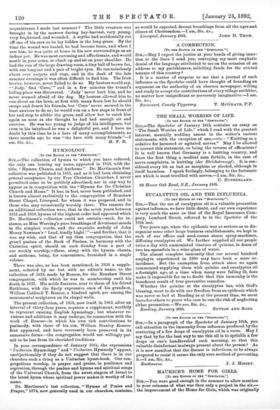HYMNOLOGY.
[TO THE EDITOR OF THE "SPECTATOR."]
Sin,—The collection of hymns to which you have referred, the only one bearing my name, appeared in 1858, with the title, Hymns, Chants, and Anthems." Dr. Martineau's first collection was published in 1851, and as it had been obtaining general acceptance by our Free Christian Churches, I never permitted mine to be publicly advertised, nor in any way to appear as in competition with the " Hymns for the Christian Church and Home." It has, in fact, never been published, and is known almost exclusively to the congregation of Renshaw Street Chapel, Liverpool, for whom it was prepared, and to those who may occasionally worship there. The reasons for an additional collection were, that in the seven years between 1851 and 1858, hymns of the highest order had appeared which Dr. Martineau's collection could not contain—such, for in- stance, as Miss Wareing's pure breathings of devotional moods in the simplest words, and the exquisite melody of John Henry Newman's " Lead, kindly Light ! "—and further, that it was my wish, and that of my then congregation, that the grand psalms of the Book of Psalms, in harmony with the Christian spirit, should on each Sunday form a part of our weekly worship,—these, along with the hymns, chants, and anthems, being, for convenience, furnished in a single volume.
There was also, as has been mentioned, in 1836 a supple. ment, selected by me but with no editor's name, to the collection of 1818, made by Roscoe, for the Renshaw Street congregation, with which he was in membership until his death in 1831. His noble features, near to those of his friend Rathbone, with the finely expressive ones of his grandson, William Caldwell T. Roscoe, a kindred spirit, are among the monumental sculptures on its chapel walls.
The present collection, of 1858, now itself, in 1892, after an interval of thirty-four years, requires a supplement, worthily to represent existing English hymnology; but whatever re- visions and additions it may undergo, its connection with the work of Roscoe—in which his own rich contributions to psalmody, with those of his son, William Stanley Roscoe, first appeared, and have reverently been preserved in its successive forms—the congregation would not willingly per- mit to be lost from its cherished traditions.
In your correspondence of January 16th, the expressions " Unitarian Hymnology" and " Unitarian Hymnody" appear, unobjectionably if they do not suggest that there is in our churches such a thing as a Unitarian hymn-book. Our con- gregations worship, in prayer and praise, in penitence and aspiration, through the psalms and hymns and spiritual songs of the Universal Church, from the sweet singers of Israel to the latest hymn whose spiritual power makes it worthy of the name.
Dr. Martineau's last collection, " Hymns of Praise and Prayer," 1874, now generally used in our churches, contains,
Liverpool, January 18th. JOHN H. THOM.


































 Previous page
Previous page